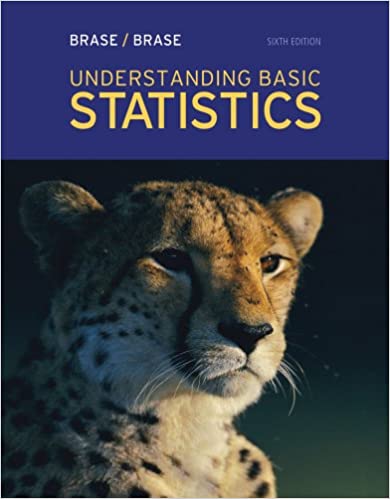
Understanding Basic Statistics 6th Edition by Charles Henry Brase,Corrinne Pellillo Brase
Edition 6ISBN: 978-1111827021
Understanding Basic Statistics 6th Edition by Charles Henry Brase,Corrinne Pellillo Brase
Edition 6ISBN: 978-1111827021 Exercise 56
Use the following steps (i)-(v) for all hypothesis tests:
(i) What is the level of significance State the null and alternate hypotheses.
(ii) Check Requirements What sampling distribution will you use What assumptions are you making What is the value of the sample test statistic
(iii) Find (or estimate) the P -value. Sketch the sampling distribution and show the area corresponding to the P -value.
(iv) Based on your answers in parts (i)-(iii), will you reject or fail to reject the null hypothesis Are the data statistically significant at level a
(v) Interpret your conclusion in the context of the application.
Note: For degree of freedom d.f. not in the Student's t table, use the closest d.f. that is smaller. In some situations, this choice of d.f. may increase the P -value a small amount and thereby produce a slightly more "conservative" answer.
Testing and Estimating a Proportion p Although older Americans are most afraid of crime, it is young people who are more likely to be the actual victims of crime. It seems that older people are more cautious about the people with whom they associate. A national survey showed that 10% of all people ages 16-19 have been victims of crime (Reference: Bureau of Justice Statistics ). At Jefferson High School, a random sample of n = 68 students (ages 16-19) showed that r = 10 had been victims of a crime.
(a) Do these data indicate that the population proportion of students in this school (ages 16-19) who have been victims of a crime is different (either way) from the national rate for this age group Use = 0.05. Do you think the conditions np 5 and nq 5 are satisfied in this setting Why is this important
(b) Find a 90% confidence interval for the proportion of students in this school (ages 16-19) who have been victims of a crime.
(c) How large a sample size should be used to be 95% sure that the sample proportion
 is within a margin of error E = 0.05 of the population proportion of all students in this school (ages 16-19) who have been victims of a crime Hint: Use sample data
is within a margin of error E = 0.05 of the population proportion of all students in this school (ages 16-19) who have been victims of a crime Hint: Use sample data
 as a preliminary estimate for p.
as a preliminary estimate for p.
(i) What is the level of significance State the null and alternate hypotheses.
(ii) Check Requirements What sampling distribution will you use What assumptions are you making What is the value of the sample test statistic
(iii) Find (or estimate) the P -value. Sketch the sampling distribution and show the area corresponding to the P -value.
(iv) Based on your answers in parts (i)-(iii), will you reject or fail to reject the null hypothesis Are the data statistically significant at level a
(v) Interpret your conclusion in the context of the application.
Note: For degree of freedom d.f. not in the Student's t table, use the closest d.f. that is smaller. In some situations, this choice of d.f. may increase the P -value a small amount and thereby produce a slightly more "conservative" answer.
Testing and Estimating a Proportion p Although older Americans are most afraid of crime, it is young people who are more likely to be the actual victims of crime. It seems that older people are more cautious about the people with whom they associate. A national survey showed that 10% of all people ages 16-19 have been victims of crime (Reference: Bureau of Justice Statistics ). At Jefferson High School, a random sample of n = 68 students (ages 16-19) showed that r = 10 had been victims of a crime.
(a) Do these data indicate that the population proportion of students in this school (ages 16-19) who have been victims of a crime is different (either way) from the national rate for this age group Use = 0.05. Do you think the conditions np 5 and nq 5 are satisfied in this setting Why is this important
(b) Find a 90% confidence interval for the proportion of students in this school (ages 16-19) who have been victims of a crime.
(c) How large a sample size should be used to be 95% sure that the sample proportion
 is within a margin of error E = 0.05 of the population proportion of all students in this school (ages 16-19) who have been victims of a crime Hint: Use sample data
is within a margin of error E = 0.05 of the population proportion of all students in this school (ages 16-19) who have been victims of a crime Hint: Use sample data  as a preliminary estimate for p.
as a preliminary estimate for p.Explanation
(a) A national survey reports that 10% o...
Understanding Basic Statistics 6th Edition by Charles Henry Brase,Corrinne Pellillo Brase
Why don’t you like this exercise?
Other Minimum 8 character and maximum 255 character
Character 255


